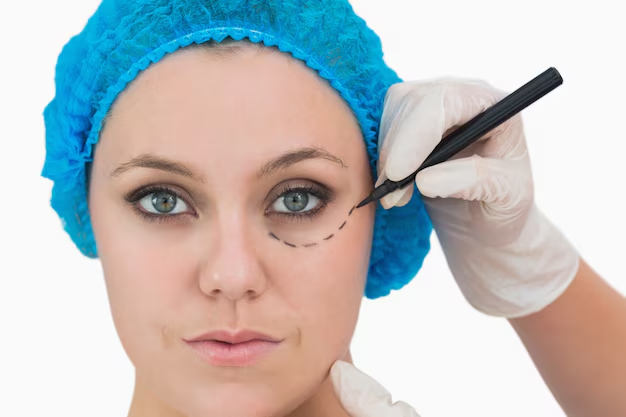Your Guide to Does Medicare Pay For Eyelid Surgery
What You Get:
Free Guide
Free, helpful information about Medicare FAQ and related Does Medicare Pay For Eyelid Surgery topics.
Helpful Information
Get clear and easy-to-understand details about Does Medicare Pay For Eyelid Surgery topics and resources.
Personalized Offers
Answer a few optional questions to receive offers or information related to Medicare FAQ. The survey is optional and not required to access your free guide.
Is Eyelid Surgery Covered by Medicare? Here’s What You Need to Know
If you're considering eyelid surgery, commonly known as blepharoplasty, you may be wondering if your Medicare coverage will help with the costs. The answer is that it depends on the circumstances. Medicare, which primarily serves individuals over the age of 65 and those with certain disabilities, typically does not cover procedures considered purely cosmetic, like many eyelid surgeries. However, if the surgery is deemed medically necessary, Medicare Part B might cover some of the costs.
When Eyesight Counts: Medical Necessity
Medicare Part B can cover eyelid surgery if it’s medically necessary, meaning the surgery is needed for reasons beyond cosmetic enhancement. For instance, if sagging eyelids severely impair vision and affect daily activities like reading or driving, your doctor may determine that the surgery is needed to improve functionality. In such cases, thorough documentation from a healthcare provider is required to establish medical necessity. This typically includes:
- Visual field test results showing how eyelid droop impacts vision.
- Doctor's notes or referrals explaining the medical condition and need for surgery.
- Possibly photographs to provide visual proof of the impairment.
Once Medicare deems the procedure medically necessary, it can cover a significant portion of the costs, although beneficiaries are typically responsible for some out-of-pocket expenses such as deductibles and copayments.
Navigating the Red Tape: Approvals and Coverage
Before proceeding with surgery, it's crucial to get pre-approval from Medicare. The process involves your healthcare provider submitting the necessary documentation and justification for the surgery. Delays or denials can occur if this step is skipped or insufficient information is provided.
It's also worth mentioning that even when approved, Medicare may not cover all aspects of the surgery, such as the cosmetic-enhancement portions. Communicate with your provider and Medicare to understand what exact costs you can expect to shoulder.
Exploring Financial Assistance Options
Not everyone qualifies for Medicare-covered eyelid surgery, but this doesn’t mean that help is out of reach. Many people explore financial assistance programs to manage healthcare costs. Alongside speaking to a health advisor, consider the following resources:
Financial Relief Tools
- Medicaid: If eligible, Medicaid may offer complimentary or reduced-cost coverage options.
- Healthcare Co-ops: These organizations sometimes offer discounts or financing plans for members.
- Health Savings Accounts (HSAs) or Flexible Spending Accounts (FSAs): These can be used to pay medical expenses with pre-tax dollars.
Additional Aid and Resources
If you're considering other options to pay for your surgery or need financial assistance beyond Medicare, here’s a quick guide to help you navigate the possibilities:
- 📉 Debt Relief Programs: Explore options for reducing medical debt through debt management plans or negotiated settlements.
- 💳 Credit Card Solutions: Some credit cards offer financing for medical procedures with low or zero interest for an introductory period. Be mindful of interest rates after any promotional periods.
- 🎓 Educational Grants: While primarily for educational purposes, some grants and scholarships may apply toward health-related expenses for students or their families.
Quick Reference: Financial Assistance Programs and Solutions
| 💡 Program/Tool | Description |
|---|---|
| Medicare Part B | Covers medically necessary eyelid surgery costs. |
| Medicaid | State-wide assistance may cover some surgical expenses. |
| Health Savings Accounts (HSAs) | Use pre-tax dollars for eligible healthcare expenses. |
| Debt Relief Programs | Assistance to manage or reduce medical debts. |
| Credit Card Financing | Low-interest medical payment options. |
| Healthcare Co-ops | Member benefits for medical services. |
Understanding what options are available can ease the financial burden of eyelid surgery, whether or not Medicare steps in to assist. Whether opting for alternative treatments or preparing for necessary documentation, it’s important to consult with your healthcare provider and financial advisor to make informed decisions.
What You Get:
Free Medicare FAQ Guide
Free, helpful information about Does Medicare Pay For Eyelid Surgery and related resources.

Helpful Information
Get clear, easy-to-understand details about Does Medicare Pay For Eyelid Surgery topics.

Optional Personalized Offers
Answer a few optional questions to see offers or information related to Medicare FAQ. Participation is not required to get your free guide.


Discover More
- a Medical Provider That Accepts Medicare Assignment Must
- a Medical Provider That Accepts Medicare Assignment Must Quizlet
- a Medicare Patient Received Treatment That Isn't Covered By Medicare
- a Medicare Patient Receives Treatment That Isn't Covered By Medicare
- a Medicare Supplement Basic Benefit Is Quizlet
- a Medicare Supplement Companies
- a Medicare Supplement Policy Is Quizlet
- a Medicare Supplement Policy Must Not Contain Benefits Which
- a Patient Received Treatment In August Medicare
- Am I Eligible For Medicare
